#commodities marketplaces
Explore tagged Tumblr posts
Text
No where in this article do they refer to the gestational carrier as a birth mother
PUBLISHED FRI, JUN 23 20239:54 AM EDTUPDATED FRI, JUN 23 20231:18 PM EDT by Courtney Reagan@COURTREAGANWATCH LIVEKEY POINTS
Almost two-thirds, 63%, of LGBTQ+ people plan to use assisted reproductive technology, foster care, or adoption to become parents, according to a survey by Family Equality. Gay male couples typically face a more expensive journey, as surrogacy or adoption are their primary choices. While more employers are offering fertility benefits, many of these packages are limited when it comes to covering surrogacy. Gay men face more challenges and higher costs to start family.
Bret Shuford and Stephen Hanna knew from early on in their relationship they wanted to raise a child together. But the married couple didn’t think a biological child was a possibility. As freelancers in the creative arts, Shuford and Hanna don’t always see steady income, even when working on Broadway. The Houston-based couple, known as the “Broadway Husbands,” thought having a child with a donor egg and gestational carrier “seemed like it was something that was only available to people who were very wealthy,” said Shuford, 44.
It’s a safe assumption that having a child with a surrogate, now most often called a gestational carrier, is cost-prohibitive. While expenses vary widely due to a number of medical and legal factors, “the average cost of surrogacy in America has gone from $75,000 five years ago, to anywhere between $150,000 and $250,000 today,” according to Dr. Brian Levine, a reproductive endocrinologist who founded surrogacy matching platform Nodal.
In the U.S., there are only about 5,000 successful surrogacy journeys per year, Nodal estimates.“That’s only about 8% of met need,” Levine said. “In plain English, 92% of the people that dream of starting or growing or completing a family with surrogacy will not be able to do so in America due to the sheer time and cost constraints that are there today.”
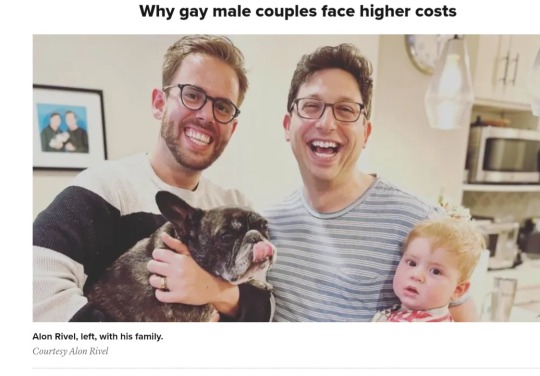
Why gay male couples face higher costs
Alon Rivel always wanted to be a father. “As I grew up, I realized I was gay,” said Rivel, 34. “So I thought, this will never happen for me. I don’t have the money, but I wanted it desperately.” "We were shocked when we started to look into [having a biological child] and realized nothing is covered by insurance unless you can prove that you’re infertile,” said Rivel, who lives in Arlington, Massachusetts. He and his husband believed that “this is complete discrimination on the insurance company’s part because we are gay men.” “It is not a choice,” Rivel added. “We were born this way and, thus, we are actually infertile.” Experts say the demand for surrogacy relationships has grown since same-sex marriage became legal in the U.S. in 2015. Gay male couples typically face a more expensive journey, as surrogacy or adoption are their primary choices. In contrast, same-sex female couples are often able to carry pregnancies to term on their own, though they may possibly have to pay for donor sperm and fertilization.
"Sadly, we do see in some states that there are laws that discriminate against the LGBTQ+ community". Betsy Campbell CHIEF ENGAGEMENT OFFICER FOR RESOLVE: THE NATIONAL INFERTILITY ASSOCIATION
Donor eggs are exponentially more expensive than donor sperm largely because the egg retrieval process is more invasive and complicated. While costs, again, vary wildly, donor eggs and the associated costs can range between $20,000 and $60,000, according to fertility marketplace GoStork, while donor sperm can be from as little as several hundred dollars to around $1,000. Donor eggs, meanwhile, are only one of many expenses.
Shuford and Hanna’s health insurance covered only the tests done on their sperm samples. Their remaining expenses, they estimate, ran between $150,000 and $180,000. That included around $40,000 for donor eggs, the medical costs to create, store, test and freeze embryos, medical insurance and out-of-pocket medical costs for their gestational carrier, her compensation, and other expenses. The couple used savings, credit cards and high-interest loans to cover that tab. Rivel and his husband’s journey to parenthood ultimately cost $220,000.
“We’re taking money away from our child’s college fund,” he said. “We’re taking money away from our mortgage.”
“Compared to [many of] our friends, our baseline is $200,000 below where they started,” Rivel added.
Employer fertility benefits offer limited help
More employers are starting to offer fertility benefits, often through a specialized fertility benefits manager such as Kindbody, Carrot, Progyny or Maven. In 2022, 40% of U.S. employers offered some type of fertility coverage, up from 30% in 2020, according to the International Foundation of Employee Benefit Plans. Fertility IQ, which keeps a workplace index of employer fertility benefits, found the average amount of fertility coverage in 2021 was $36,000 per lifetime, flat from the year before. But while more companies are offering fertility benefits, many of these packages are limited when it comes to covering what’s needed to build families using non-traditional methods. Almost two-thirds, 63%, of LGBTQ+ people plan to use assisted reproductive technology, foster care or adoption to become parents, according to a survey by Family Equality. Yet fewer than half of employers offering fertility benefits provided any benefits for adoption, and only about 10% provided benefits related to surrogacy, according to a 2021 survey from Resolve: The National Infertility Association and health-care consultancy Mercer. And state laws requiring employers of a certain size to offer fertility benefits often leave out coverage for third-party reproduction such as a gestational carrier or the purchase of donor eggs or donor sperm.
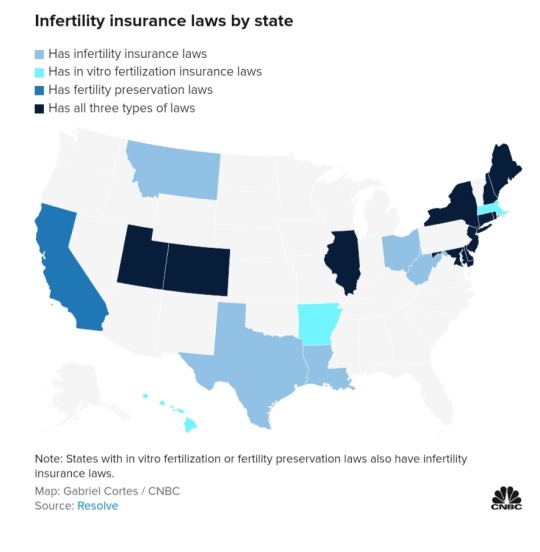
“I honestly believe that employers don’t realize there is a gap in their benefits. And they often don’t know this until an employee points that out,” said Betsy Campbell, chief engagement officer for Resolve.
She said many employers she speaks to have “the best intentions” but don’t understand how gestational surrogacy works or how family building benefits fall short.
Will Porteous, 39, became a father through gestational surrogacy before joining Maven as its chief growth officer. He and his husband tabulated their parenthood path cost at close to $175,000. “No employer in the entire country that I’m aware of offers anything greater than $75,000 a year, and so that only covers a portion.”
But Porteous, who lives in Wynnewood, Pennsylvania, said full coverage isn’t necessarily what LGBTQ+ couples want to see. “The expectation is to have equitable support to your other co-workers and seeing that your employer cares about that journey,” he said.
That employer support, Porteous said, “really means a lot and it shows that you as an employer care about your employee, regardless of how they’re going to build their family.”
Fertility benefits can help recruit, retain talent
While fertility benefits manager Progyny’s first clients were largely West Coast “Silicon Valley-type” businesses, according to CEO Pete Anevski, it now works with employers in 40 industries.
“There’s a flywheel effect happening,” he said, with more companies realizing benefits need to include family-building coverage “to be competitive, to attract and retain talent in what is still a tight labor market, an inflationary economy, even with concerns around a looming recession.”
Fertility benefits manager Carrot said it has around 800 corporate clients and 80% of those offer their employees a benefit for surrogacy. “We have seen an increase in surrogacy claims year over year at about 250%,” said CEO Tammy Sun.
Offering these types of benefits can be key factors for a company when job candidates are making decisions about employment, said Taryn Branca, chief revenue officer at Kindbody.
“I can’t tell you how many of our clients will call us, we will get on the phone with potential candidates that they’re recruiting, or we will provide information to support that recruit coming there because they are asking for very specific information before they’ll accept the offer: if they have surrogacy benefits, if they have donor benefits,” she said.
More than half of respondents in a new Progyny survey of LGBTQ+ community members said they are actively looking to build their families. Of that population, 79% would consider leaving their current job for one that offers better fertility and family-building benefits, and 80% would consider taking a second job to receive those benefits.
“This is not a ‘nice to have,’ this is a ‘need to have’ benefit,” Anevski said.
Rivel’s husband is an early employee at Massachusetts-based Beam Therapeutics. At Rivel’s insistence, he asked his human resources department to look into including surrogacy benefits. Eventually, the company added a surrogacy reimbursement benefit, which at the time Rivel and his husband used it was worth $10,000.
While $10,000 was a small dent in the couple’s $220,000 surrogacy journey, Rivel said it’s better than nothing. “It’s really admirable that they have it,” he said. “I think it’s a really smart benefit for recruiting more people.”
Adoption also comes with high costs, risks
Adoption is certainly another family-building option. “It’s not for everyone ... it’s not without its costs, and the laws vary by state,” Resolve’s Campbell said. “Sadly, we do see in some states that there are laws that discriminate against the LGBTQ+ community, so that’s definitely a consideration.”
The average nonfoster-system adoption costs between $25,000 and $60,000, according to the Child Welfare Information Gateway. As with surrogacy relationships, the adopting parents cover related expenses for all parties, from medical to legal, plus living expenses if a match is made in advance of a birth. And, of course, there are no guarantees.
Shuford and Hanna decided adoption wasn’t a path for them. “There’s a lot of risks involved that we weren’t willing to take,” Hanna said. “We had heard of stories involving birth mothers changing their minds, and children having birth defects that without [genetic embryo testing] weren’t known.”
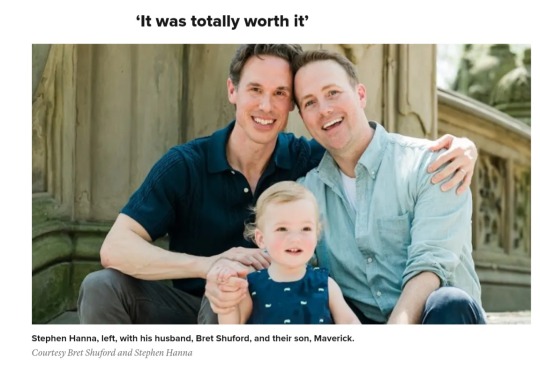
Like many gestational carrier stories, Shuford and Hanna’s was far from easy or straightforward.
Their first carrier dropped out of the process shortly before the embryo transfer was scheduled to take place but well after contracts had been signed and medical assessments and travel had occurred. The Covid-19 pandemic delayed the process with their second gestational carrier; then, after the first embryo transfer, the pregnancy ended in a devastating miscarriage. The second embryo transfer worked, and their surrogate gave birth to their son, Maverick, in 2022.
“So many times, we felt very excluded,” Shuford said. “We want to be able to have a family and raise our child and have that child be biologically related to us, and we have a right to do that, and we have a right to feel seen and validated in that process.”
But for Shuford, “in the end, it was totally worth it.”
“I mean, Maverick is amazing,” he added. “And we’re so lucky to have a healthy baby and also having someone like Crystal, our surrogate who carried our child.”
“I don’t know that I’ve ever experienced that kind of love in my life,” Shuford said. “So it’s really a powerful experience.”
#Men can't have babies#anti surrogacy sunday#anti exploiting women#babies are not commodities#Nodal#Fertility marketplace#no one is entitled to biological children#No one is entitled to biological children while insurance rates for other people are raised to cover the cost of egg donations and surrogac#The only women referred to as birth mothers are women who changed their mind about giving up their babies
9 notes
·
View notes
Photo
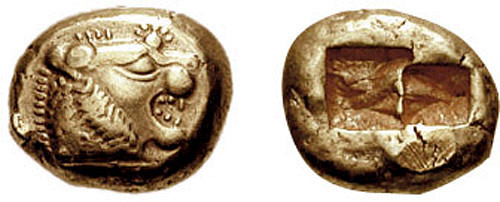
The Invention of the First Coinage in Ancient Lydia
Money may take many forms, from the digital code of cryptocurrency to the woodpecker scalps favoured in early California. People have also used cattle, cacao beans, cowrie shells, chewing gum, grain, and giant stones as money. Early cultures became especially fond of metals, particularly silver, gold, and electrum (an alloy of the other two). These held their value (unlike a dead cow), were easy to transport (unlike a giant stone), and they could be measured out in exact amounts and fractions (unlike a woodpecker scalp). The only problem with metals is all the weighing. This adds time to every transaction, increasing the inconvenience and costs of doing business with bullion. There had to be a better way – and the ancient Lydians invented it.
Lydians Invent Coinage
In approximately 630 BCE, someone in the Anatolian kingdom of Lydia stamped a piece of precious metal with something akin to a signet ring. One outcome of this simple act was that it increased confidence in the lump’s weight and purity when later used in the marketplace. This procedure did nothing to modify the intrinsic value of the commodity, but it simplified the exchange of bullion for anyone willing to accept the stamp’s guarantee prima facie rather than reweighing and retesting the lump every time it was traded. Merchants could set aside their cumbersome scales, weights, and touchstones to accelerate their transactions by counting out, not weighing out, this new form of currency. The Greeks, who quickly adopted this Lydian technology, named the coins nomismata because they functioned as money by accepted convention (nomos).
That acceptance probably grew by degrees. The first time a fellow showed up in a Lydian marketplace with some stamped chunks of electrum, most of his neighbors may not have noticed or cared. The metal went into the balance pan with other bullion to pay a debt or purchase a lamb. Nothing differentiated the stamped and unstamped pieces until people could agree, by custom (nomos), that the message punched into the metal had special meaning. At that point, the object obtained the three essential elements of a coin as later stipulated by Isidore of Seville in the seventh century CE: acceptable metal, weight, and design. The stamps were rudimentary affairs at first, bearing messages in Greek or Lydian stating, "I am the signet of Phanes" or "I am of Kukas."
It must be remembered, however, that ancient peoples treated a seal more formally than we do a signature; the seal embodied the full power and prestige of the person associated with it. We might compare this to a document that has been notarized and not merely signed. These legends accompanied diverse images ranging from a lion to a stag, all hammered into the metal by a hardened die. Persons such as Phanes and Kukas (perhaps one a military commander and the other a king) stood surety for their stamped bullion in terms of its quality and quantity. Their prior involvement with the metal made it easier to transact business using it. To make this innovation even more convenient, coins were struck in seven denominations going down to a minute fraction (1/192) of a stater weighing less than a tenth of a gram (0.004 oz). This fact suggests a high degree of coin-based monetization, accommodating payments large and small across the Lydian economy.
Book Excerpt
Continue reading...
57 notes
·
View notes
Text
Neoliberalism denies society's power to shape human subjectivities, instead imagining a free-willed, autonomous individual unaffected by material circumstance. It also decontextualizes and dehistoricizes human agents and their objects, in effect de-culturing the world in a way that allows commodities (and, according to Olivier Roy, religions) to be sold and consumed transnationally by diverse individuals in sundry places. At its core, then, it depends upon a fancifully imagined human subject that is completely unfettered by its history and social locations. Neoliberalism, write the anthropologists Jean and John Comaroff, "re-visions persons not as producers from a particular community, but as consumers in a planetary marketplace: persons as ensembles of identity that owe less to history or society than to organically conceived qualities."
Sean McCloud, "Haunting Desires: Agency in an Era of Possessions," in American Possessions: Fighting Demons in the Contemporary United States (New York, NY: Oxford University Press, 2015), 107.
157 notes
·
View notes
Text
How Trump's billionaires are hijacking affordable housing
Thom Hartmann
October 24, 2024 8:52AM ET

Republican presidential nominee and former U.S. President Donald Trump attends the 79th annual Alfred E. Smith Memorial Foundation Dinner in New York City, U.S., October 17, 2024. REUTERS/Brendan McDermid
America’s morbidly rich billionaires are at it again, this time screwing the average family’s ability to have decent, affordable housing in their never-ending quest for more, more, more. Canada, New Zealand, Singapore, and Denmark have had enough and done something about it: we should, too.
There are a few things that are essential to “life, liberty, and the pursuit of happiness” that should never be purely left to the marketplace; these are the most important sectors where government intervention, regulation, and even subsidy are not just appropriate but essential. Housing is at the top of that list.
A few days ago I noted how, since the Reagan Revolution, the cost of housing has exploded in America, relative to working class income.
When my dad bought his home in the 1950s, for example, the median price of a single-family house was around 2.2 times the median American family income. Today the St. Louis Fed says the median house sells for $417,700 while the median American income is $40,480—a ratio of more than 10 to 1 between housing costs and annual income.
ALSO READ: He’s mentally ill:' NY laughs ahead of Trump's Madison Square Garden rally
In other words, housing is about five times more expensive (relative to income) than it was in the 1950s.
And now we’ve surged past a new tipping point, causing the homelessness that’s plagued America’s cities since George W. Bush’s deregulation-driven housing- and stock-market crash in 2008, exacerbated by Trump’s bungling America’s pandemic response.
And the principal cause of both that crash and today’s crisis of homelessness and housing affordability has one, single, primary cause: billionaires treating housing as an investment commodity.
A new report from Popular Democracy and the Institute for Policy Studies reveals how billionaire investors have become a major driver of the nationwide housing crisis. They summarize in their own words:
— Billionaire-backed private equity firms worm their way into different segments of the housing market to extract ever-increasing rents and value from multi-family rental, single-family homes, and mobile home park communities. — Global billionaires purchase billions in U.S. real estate to diversify their asset holdings, driving the creation of luxury housing that functions as “safety deposit boxes in the sky.” Estimates of hidden wealth are as high as $36 trillion globally, with billions parked in U.S. land and housing markets. — Wealthy investors are acquiring property and holding units vacant, so that in many communities the number of vacant units greatly exceeds the number of unhoused people. Nationwide there are 16 million vacant homes: that is, 28 vacant homes for every unhoused person. — Billionaire investors are buying up a large segment of the short-term rental market, preventing local residents from living in these homes, in order to cash in on tourism. These are not small owners with one unit, but corporate owners with multiple properties. — Billionaire investors and corporate landlords are targeting communities of color and low-income residents, in particular, with rent increases, high rates of eviction, and unhealthy living conditions. What’s more, billionaire-owned private equity firms are investing in subsidized housing, enjoying tax breaks and public benefits, while raising rents and evicting low-income tenants from housing they are only required to keep affordable, temporarily. (Emphasis theirs.)
It seems that everywhere you look in America you see the tragedy of the homelessness these billionaires are causing. Rarely, though, do you hear about the role of Wall Street and its billionaires in causing it.
The math, however, is irrefutable.
Thirty-two percent is the magic threshold, according to research funded by the real estate listing company Zillow. When neighborhoods hit rent rates in excess of 32 percent of neighborhood income, homelessness explodes. And we’re seeing it play out right in front of us in cities across America because a handful of Wall Street billionaires are making a killing.
As the Zillow study notes:
“Across the country, the rent burden already exceeds the 32 percent [of median income] threshold in 100 of the 386 markets included in this analysis….”
And wherever housing prices become more than three times annual income, homelessness stalks like the grim reaper. That Zillow-funded study laid it out:
“This research demonstrates that the homeless population climbs faster when rent affordability — the share of income people spend on rent — crosses certain thresholds. In many areas beyond those thresholds, even modest rent increases can push thousands more Americans into homelessness.”
This trend is massive.
As noted in a Wall Street Journal article titled “Meet Your New Landlord: Wall Street,” in just one suburb (Spring Hill) of Nashville:
“In all of Spring Hill, four firms … own nearly 700 houses … [which] amounts to about 5% of all the houses in town.”
This is the tiniest tip of the iceberg.
“On the first Tuesday of each month,” notes the Journal article about a similar phenomenon in Atlanta, investors “toted duffels stuffed with millions of dollars in cashier’s checks made out in various denominations so they wouldn’t have to interrupt their buying spree with trips to the bank…”
The same thing is happening in cities and suburbs all across America; agents for the billionaire investor goliaths use fine-tuned computer algorithms to sniff out houses they can turn into rental properties, making over-market and unbeatable cash bids often within minutes of a house hitting the market.
After stripping neighborhoods of homes young families can afford to buy, billionaires then begin raising rents to extract as much cash as they can from local working class communities.
In the Nashville suburb of Spring Hill, the vice-mayor, Bruce Hull, told the Journal you used to be able to rent “a three bedroom, two bath house for $1,000 a month.” Today, the Journal notes:
“The average rent for 148 single-family homes in Spring Hill owned by the big four [Wall Street billionaire investor] landlords was about $1,773 a month…”
As the Bank of International Settlements summarized in a 2014 retrospective study of the years since the Reagan/Gingrich changes in banking and finance:
“We describe a Pareto frontier along which different levels of risk-taking map into different levels of welfare for the two parties, pitting Main Street against Wall Street. … We also show that financial innovation, asymmetric compensation schemes, concentration in the banking system, and bailout expectations enable or encourage greater risk-taking and allocate greater surplus to Wall Street at the expense of Main Street.”
It’s a fancy way of saying that billionaire-owned big banks and hedge funds have made trillions on housing while you and your community are becoming destitute.
Ryan Dezember, in his book Underwater: How Our American Dream of Homeownership Became a Nightmare, describes the story of a family trying to buy a home in Phoenix. Every time they entered a bid, they were outbid instantly, the price rising over and over, until finally the family’s father threw in the towel.
“Jacobs was bewildered,” writes Dezember. “Who was this aggressive bidder?”
Turns out it was Blackstone Group, now the world’s largest real estate investor run by a major Trump supporter. At the time they were buying $150 million worth of American houses every week, trying to spend over $10 billion. And that’s just a drop in the overall bucket.
As that new study from Popular Democracy and the Institute for Policy Studies found:
“[Billionaire Stephen Schwarzman’s] Blackstone is the largest corporate landlord in the world, with a vast and diversified real estate portfolio. It owns more than 300,000 residential units across the U.S., has $1 trillion in global assets, and nearly doubled its profits in 2021. “Blackstone owns 149,000 multi-family apartment units; 63,000 single-family homes; 70 mobile home parks with 13,000 lots through their subsidiary Treehouse Communities; and student housing, through American Campus Communities (144,300 beds in 205 properties as of 2022). Blackstone recently acquired 95,000 units of subsidized housing.”
In 2018, corporations and the billionaires that own or run them bought 1 out of every 10 homes sold in America, according to Dezember, noting that:
“Between 2006 and 2016, when the homeownership rate fell to its lowest level in fifty years, the number of renters grew by about a quarter.”
And it’s gotten worse every year since then.
This all really took off around a decade ago following the Bush Crash, when Morgan Stanley published a 2011 report titled “The Rentership Society,” arguing that snapping up houses and renting them back to people who otherwise would have wanted to buy them could be the newest and hottest investment opportunity for Wall Street’s billionaires and their funds.
Turns out, Morgan Stanley was right. Warren Buffett, KKR, and The Carlyle Group have all jumped into residential real estate, along with hundreds of smaller investment groups, and the National Home Rental Council has emerged as the industry’s premiere lobbying group, working to block rent control legislation and other efforts to control the industry.
As John Husing, the owner of Economics and Politics Inc., told The Tennessean newspaper:
“What you have are neighborhoods that are essentially unregulated apartment houses. It could be disastrous for the city.”
As Zillow found:
“The areas that are most vulnerable to rising rents, unaffordability, and poverty hold 15 percent of the U.S. population — and 47 percent of people experiencing homelessness.”
The loss of affordable homes also locks otherwise middle class families out of the traditional way wealth is accumulated — through home ownership: over 61% of all American middle-income family wealth is their home’s equity.
And as families are priced out of ownership and forced to rent, they become more vulnerable to homelessness.
Housing is one of the primary essentials of life. Nobody in America should be without it, and for society to work, housing costs must track incomes in a way that makes housing both available and affordable.
Singapore, Denmark, New Zealand, and parts of Canada have all put limits on billionaire, corporate, and foreign investment in housing, recognizing families’ residences as essential to life rather than purely a commodity. Multiple other countries are having that debate or moving to take similar actions as you read these words.
America should, too.
ALSO READ: Not even ‘Fox and Friends’ can hide Trump’s dementia
16 notes
·
View notes
Text
Founder’s terminal illness spells the end for Flibusta, a treasure trove of pirated Russian literature
Known only by his callsign “Stiver,” the founder and administrator of the online library Flibusta announced in a brief message on Tuesday that the project will soon shut down. In the same message, he revealed that he’s been diagnosed with a brain tumor. “Unfortunately, it seems this is the end for Flibusta and for yours truly,” wrote Stiver, explaining that the website’s servers are paid for a few more weeks, after which the online library will cease to exist.
What is Flibusta?
It’s an online library that openly flouts copyright laws and features more than 630,000 books — roughly 83 percent in Russian. The project’s peak popularity was a decade ago when as many as 4 million people visited the site each month. By the spring of 2016, however, monthly traffic had fallen to just 163,000 visits, thanks to decisions by Russia’s federal censor to block access to Flibusta and the Moscow City Court’s ruling to block the online library permanently for repeated copyright violations.
Flibusta emerged in October 2009 when several disgruntled users of Librusek (an earlier online library) launched their own rival project in protest against Librusek’s publishing agreement with Litres, Russia’s biggest legal e-book and audiobook marketplace. (Litres itself is the product of a merger of the country’s three major online libraries that had been distributing pirated content.) According to the deal, books that appeared on Litres were unavailable for download to Librusec users for a month.
Flibusta’s anonymous founder, identifying himself as Stiver, described the break as an ideological schism and faulted Librusek founder Ilya Larin for committing the cardinal sin of “mixing piracy and business.” In 2011, Stiver declared that “Larin was never an ideological pirate.” Stiver insisted that only non-commercial projects are invulnerable to book publishers’ pressure: “The generation of profit-seekers cannot understand that people just want to read books without turning them into a commodity. Let people read. Let them read a lot, and let them read well. That's all we need.”
Problems with the authorities
It wasn’t long before Russian book publishers turned their attention to Flibusta. In September 2011, Stiver reported issues accessing the online library, claiming that his hosting provider was “under heavy pressure” and had asked to disable direct access to the website during an ongoing investigation. Eksmo Publishing House later revealed that its lawyers had contacted the Dutch hosting company Ecatel with a request to disclose the identity of Flibusta’s owners. Two years later, Flibusta started independently blocking access to certain books amid complaints from the project’s team that book publishers weren’t providing them with lists of materials subject to copyright claims.
In 2016, the German police ended a two-year investigation into Stiver, finding no evidence of criminal activity. Months earlier, the CEO of the Association for the Protection of Rights on the Internet (which includes Eksmo) said he knew Stiver’s real name but wouldn’t reveal it to protect the investigation’s confidentiality. When the German authorities closed the case, the association’s head expressed disappointment and said the police had handled the matter “superficially.”
In response to being blocked in Russia, Flibusta tried to bypass censors by making the project accessible through numerous mirror sites (which distorted Similarweb traffic data) and delivering content to users through alternative channels, such as torrent trackers and a Telegram chatbot.
The death of Flibusta
Though the platform has been essentially a labor of love, “supported by a group of enthusiasts scattered across the globe,” Stiver’s recent announcement suggests that he won’t be transferring full control or the means to support the project to anyone on Flibusta’s team. On social media, users have asked the library about crowdfunding to sustain the site without Stiver, but the project’s Twitter account has merely tweeted a thread of hyperlinks to alternative online libraries.
8 notes
·
View notes
Text
I know logistically there is some poor intern livng in constant stress and anxiety about being sniped faster than a Clinton or Boeing leaker, who knows he would commit suicide by 7 shots to the back if anybody found out he was the one buying Homelander his titty milk off of Craiglist or Facebook marketplace.
But as i still think of the bookcase fridge situation i wonder... if Vought is running some Mad Max Inmortal Joe Mother's Milk operation in the basement for safety and commodity in order keep a steady supply of milk... not saying this bcuz i have a really fucked up Reader fic idea or anything (well some of that is that ofc) but i need to know... my curiosity is killing me and i aint got 9 lives to spare.
Like Vought has no issue kidnapping ppl and experimenting on them like they kidnap random moms who lost their babies and made it seem like they decided to go missing or commit suicide from the grief or it could be a weird gig... some girl getting paid a hefty amount to be Homelander heifer after signing a fuck load of NDAs.
12 notes
·
View notes
Text
Going to try to do some Japan trip blogging about relevant things. First up: I went to Comiket!
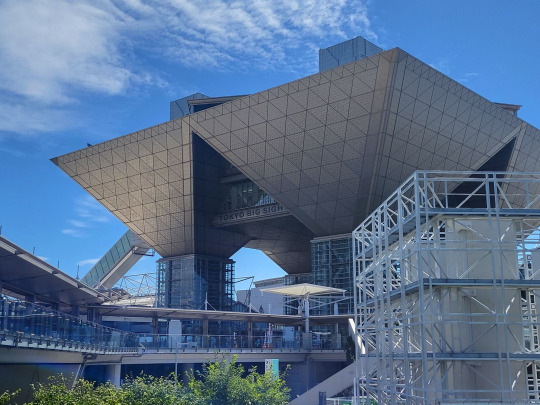
['Tokyo Big Sigh' indeed, to quote the discord friend ^^]
There was this tweet going around before the event, which to paraphrase the translation went something like "If you are hoping to have fun this weekend, get off the metro at Odaiba Beach instead. Comiket is a struggle for survival; be prepared to fight or get ready to die". And I laughed at that tweet, but my dudes it was absolutely true. Comiket's combination of scale, intensity, and sprinkle of heat stroke on the wait to get in is unlike anything I have ever seen. Over 250,000 people attended this summer's Comiket; vendor booths numbered in the thousands. Many of them are marked as 'hot commodities' - like the animation director for Bocchi the Rock, Kerorira, tabled there selling a booklet containing production docs from the show, and the line for that booth alone rounded a city block:
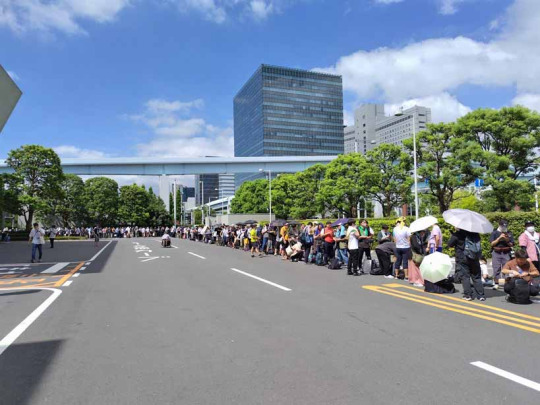
These people had priority lists and backup targets; I abandoned this entire idea from the get-go, arriving later and accepting that some things would be sold out. Absolutely the right call, but even then it was still just dizzying to try to take it all in; you can't possibly cover everything, I saw maybe half of the booths at most, and everyone's frenetic energy drags you along too into feeling like you are missing out. Its fun as well as intense though; everything being sold is unique to the event, a deeply precious work from the group that made it, and you find some extremely niche products. It was a bit surreal running into over a dozen artists & writers who I follow on Twitter from across a language barrier, in person, selling their work. It is not a convergence that happens anywhere else.
What I found interesting was that Comiket has this sort of reputation in the west as Japan's "Anime Con", despite them not being similar at all, actually! Comiket is a marketplace, not a con, as the "Comic Market" name implies - the similar starting letters are just a coincidence. While American cons do have large merch halls, and one can argue that they are merch-first affairs for many, that merch is very much not the 'point' of an anime con; the community-focused events that bring attendees together, and connect attendees to panelists, is the core focus. Meanwhile at Comiket the vendor is the focus; as an attendee you are customer, and interface with the event that way almost exclusively.
This is trivial in a certain sense ofc, but I think has knock-on effects; the idea of me, as a customer, "making friends" at Comiket seems like a non-starter. It happens the way it always can of course, but the design of the event generally mitigates against it, including making even the logistics of 'hanging out' difficult with absolutely no seating around. People can't even cosplay in the main hall! Cosplay is in its own hall, where you stand alone and have strangers take photos of you - then you change to go to vendors if you want. Western anime cons meanwhile were (initially) built to promote this directly, with events built around that. However, vendors at Comiket have an intensely different story; sharing tables, helping cover each other's booths for breaks, organizing stock together, etc. You can see how this event builds a sense of community for doujin authors; given their limited financial returns that community is imo a vital source of the longevity of Comiket as a successful event and cultural lodestone for the otaku community.
I think I sort of have a question of "why Comiket" in the back of my mind for this - why is Comiket the symbol of otakudom? Japan does have other events, more con-like ones, of course - but also Japan's fandom is just so much more focused on fanworks, and has been for way longer, with fanwork consumption as a primary mode of expression. It is a bit of a chicken vs the egg issue here; is that focus the reason Comiket is the center, or did having well-organized events like Comiket promote fanworks in a way other communities didn't have? Of course its gonna be a some of each and many more reasons besides, but attending it definitely highlighted that distinction. Comiket is a symbol of cultural difference.
Anyway will post about some of the things I got soon, gotta wax sociological for the brand first ^_^
67 notes
·
View notes
Text
there are very few justifiable reasons to buy and use plastic commodities when there are alternatives available, besides the near-unavoidable ones like food wrappers etc; what might irk me the most though, as an insufferable pedant and pathological hater, is plastic tableware and utensils. I was thinking about it while doing the dishes. Their popularity can’t exactly be explained exclusively through typical consumer practices; though they cost pennies to make given petrol subsidies, ceramic tableware has to be overall cheaper given that any thrift store, yard sale, antique store, and facebook marketplace is overflowing with the kitchen accoutrements of dead grandmas and ex wives. But as we know the American is not an intellectual, to put it mildly, and even with thrift in vogue due in part to both economic decline and youth culture’s drive for perceived esotericism, the average American consumer still buys most commodities new in-box via one of the easily accessible trash peddling megacorporations like walmart or amazon. I think another aspect of it though is the phenomenon of commodity infantilisation. Everything made for children is made out of plastic, marketed as being hard to destroy, an appealing pitch for American parents who by and large see children as mindless animals lacking all awareness and agency that couldn’t possibly be taught in their formative years how to handle objects with care or be responsible for simple chores, and as such should be provided with the most bomb proof fixtures possible, yet simultaneously expedient and disposable because it’s assumed that a child is only fit for a child’s item and it will be disposed of as they mature. Anyways i’ve already talked for too long about goddamn plastic bowls of all things but they’re basically the kitchen equivalent of funko pops to me
27 notes
·
View notes
Text
"Navigating Financial Markets: A Beginner's Guide to Investment Success"

Financial markets refer broadly to any marketplace where securities trading occurs, including the stock market, bond market, forex market, and derivatives market. Financial markets are vital to the smooth operation of capitalist economies.
What Are Financial Markets?
Financial Markets include any place or system that provides buyers and sellers the means to trade financial instruments, including bonds, equities, the various international currencies, and derivatives. Financial markets facilitate the interaction between those who need capital with those who have capital to invest.
Types of Financial Markets
There are several different types of markets. Each one focuses on the types and classes of instruments available on it.The following are different types of financial markets:
Stock Market.
Bond market.
Foreign Exchange Markets.
Commodity markets.
Derivative Market.
Futures Market.
Over-the-counter (OTC) Market.
Stock Market
Perhaps the most ubiquitous of financial markets are stock markets. These are venues where companies list their shares, which are bought and sold by traders and investors. Stock markets, or equities markets, are used by companies to raise capital and by investors to search for returns. Most stock trading is done via regulated exchanges, which plays an important economic role because it is another way for money to flow through the economy.
Bond market
Bonds are issued by corporations as well as by municipalities, states, and sovereign governments to finance projects and operations.For example, the bond market sells securities such as notes and bills issued by the United States Treasury. The bond market is also called the debt, credit, or fixed-income market.
Foreign Exchange Markets.
The Foreign Exchange Market (commonly known as the Forex Market or FX Market) is a global decentralized marketplace where currencies are traded. It is the largest financial market in the world, with a daily trading volume exceeding $7 trillion as of recent estimates. The Forex market operates 24 hours a day, five days a week, enabling participants from different time zones to engage in trading activities continuously.
Commodity Markets
Commodities markets are venues where producers and consumers meet to exchange physical commodities such as agricultural products (e.g., corn, livestock, soybeans), energy products (oil, gas, carbon credits), precious metals (gold, silver,platinum).
These are known as spot commodity markets, where physical goods are exchanged for money.However, the bulk of trading in these commodities takes place on derivatives markets that utilize spot commodities as the underlying assets.
Derivative Market
Derivatives are financial instruments whose value is derived from an underlying asset or a group of assets. These assets range from stocks, bonds, commodities, currencies, interest rates, or market indices. The derivatives market is a financial marketplace where derivative contracts are bought and sold.
A derivative is a contract between two or more parties whose value is based on an agreed-upon underlying financial asset (like a security) or set of assets (like an index).Rather than trading stocks directly, a derivatives market trades in futures and options contracts and other advanced financial products that derive their value from underlying instruments like bonds, commodities, currencies, interest rates, market indexes, and stocks.
Futures Market
Futures markets are where futures contracts are listed and traded. Unlike forwards, which trade OTC, futures markets utilize standardized contract specifications, are well-regulated, and use clearinghouses to settle and confirm trades.
Options markets, such as the Chicago Board Options Exchange (CBOE), similarly list and regulate options contracts. Both futures and options exchanges may list contracts on various asset classes, such as equities, fixed-income securities, commodities, and so on.
OTC Market
An over- the- counter (OTC) market is a decentralized market—meaning it does not have physical locations, and trading is conducted electronically—in which market participants trade securities directly (meaning without a broker).While OTC markets may handle trading in certain stocks (e.g., smaller or riskier companies that do not meet the listing criteria of exchanges), most stock trading is done via exchanges.
Certain derivatives markets, however, are exclusively OTC, making up an essential segment of the financial markets. Broadly speaking, OTC markets and the transactions that occur in them are far less regulated, less liquid, and more opaque.
Examples of Financial Markets
The above sections make clear that the "financial markets" are broad in scope and scale. To give two more concrete examples, we will consider the role of stock markets in bringing a company to IPO and the role of the OTC derivatives market in the 2008-09 financial crisis.
How Do Financial Markets Work?
Despite covering many different asset classes and having various structures and regulations, all financial markets work essentially by bringing together buyers and sellers in some asset or contract and allowing them to trade with one another. This is often done through an auction or price - discovery mechanism.
What Are the Main Functions of Financial Markets?
Financial markets exist for several reasons, but the most fundamental function is to allow for the efficient allocation of capital and assets in a financial economy. By allowing a free market for the flow of capital, financial obligations, and money, the financial markets make the global economy run more smoothly while allowing investors to participate in capital gains over time.
The Bottom Line
Financial markets provide liquidity, capital, and participation that are essential for economic growth and stability. Without financial markets, capital could not be allocated efficiently, and economic activity such as commerce and trade, investments, and growth opportunities would be greatly diminished.
Many players make markets an essential part of the economy—firms use stock and bond markets to raise capital from investors. Speculators look to various asset classes to make directional bets on future prices.
At the same time, hedgers use derivatives markets to mitigate various risks, and arbitrageurs seek to take advantage of mispricings or anomalies observed across various markets. Brokers often act as mediators that bring buyers and sellers together, earning a commission or fee for their services.
Compete Risk Free with $100,000 in Virtual Cash
Put your trading skills to the test with our free stock simulator. Compete with thousands of Investopedia traders and trade your way to the top! Submit trades in a virtual environment before you start risking your own money. Practice trading strategies so that when you're ready to enter the real market, you've had the practice you need.
Steps to Begin Investing in Financial Markets
Educate Yourself:
Learn the basics of financial instruments and how markets operate. Books, online courses, and tutorials are excellent resources.
Set Clear Goals:
Define your investment objectives, whether it’s saving for retirement, purchasing a home, or building wealth.
Determine Your Risk Tolerance:
Assess how much risk you’re comfortable taking. Younger investors might take more risks, while those nearing retirement may prefer safer investments.
Choose the Right Market:
Decide whether to focus on stocks, bonds, forex, or a mix, depending on your goals.
Open a Trading Account:
Select a reputable broker or trading platform that aligns with your investment preferences and provides user-friendly tools.
Start Small:
Begin with modest investments to gain experience and confidence.
Monitor and Adjust:
Keep track of your portfolio’s performance and make adjustments as needed to stay on track with your goals.
Common Mistakes to Avoid
Lack of Research:
Investing without understanding the market or the asset can lead to losses.
Overtrading:
Frequent buying and selling can erode returns due to fees and poor timing.
Ignoring Risk Management:
Always set stop-loss orders and consider hedging strategies to limit potential losses.
Chasing Trends:
Avoid following market hype without assessing its long-term viability.
Neglecting Diversification:
Overconcentration in a single asset or sector can magnify risks.
Conclusion
Financial markets are the backbone of the global economy, providing a platform for investment, risk management, and wealth creation. Understanding their structure and dynamics is essential for anyone looking to navigate the world of finance effectively. Whether you’re an investor or simply curious about the markets, staying informed is the first step toward making confident and informed decisions.
Navigating financial markets may seem challenging at first, but with education, clear goals, and disciplined strategies, anyone can become a successful investor. Start small, stay informed, and focus on long-term growth to make the most of the opportunities financial markets offer. Remember, investing is a journey, not a sprint, so approach it with patience and confidence.
2 notes
·
View notes
Text
i wanted to make my zafara into an usul because neopets just released a valentine usul skin which i like. and i have the name hrakaroo which is lapine for little shit hence why i chose a zafara at first because that's the closest to a hare-- like watership down. but ive also decided to start collecting usuki items on neopets (as well as plushies and dolls) so not having an usul was a bit sad for me especially as ive bought sooo many pet slots if i want to collect like.. be serious.. but anyway because they had just released a valentine usul skin the paint brush was a bit of a commodity. so i got 1.5mil together and went to buy one in marketplace listed as 1.5mil autobuy but it disappeared when i clicked it.. beaten to the punch... and every other offer on tp was like 2.5-3mil or wanting item offers of stuff i didnt have. i was offering on unlabelled posts and getting hard rejected. however i found someone with a usuki-esque name and sure enough they collected usuki. so i went through their gallery to see if i had any usuki items they didnt have for the one item requirement and also maybe to tell them i'm a fellow usuki head like them. so i sent them a usuki dream car along with my 1.5mil offer and they accepted it :) usuki power making way for my valentine usul :) usukis unite :)


pet pix tax. im trading hechno if you want him.. need to figure out what to do with him in the meantime. i was thinking baby?
3 notes
·
View notes
Text
Shocking Facts About Trading You Didn't Expect
Have you ever believed that trading was only for experts or Wall Street whiz kids? To be honest, that couldn't be more untrue. Trading is a talent that anyone can master with the correct attitude; it's not just about statistics. Allow me to introduce you to some shocking facts that will actually change your perspective on the trading field.
1. Trading Isn't Dependent on Chance It's a Talent That Anyone Can Develop

The majority of people believe that traders who are successful are simply fortunate. In actuality, discipline and preparation are key.
A learning curve exists: Actually, not even the most successful traders were born with all the answers. They studied tactics and patterns for years.
Controlling Your Emotions: In actuality, maintaining composure and making thoughtful choices even when you lose, is the backbone of trading success.
Practice Pays Off: It's true that you can gain confidence without risking everything by practicing with demo accounts or tiny deposits.
2. The World of Trading Is Greater Than You May Imagine

Let me reassure you that trading is far more varied than you may have assumed.
Foreign exchange, or forex, is a worldwide phenomena with tremendous opportunities for trading currencies such as the US dollar or the euro.
Cryptocurrency Boom: Trading is now easier than ever because of platforms like Ethereum and Bitcoin, which are revolutionizing the market.
Commodities: Did you know that people exchange coffee, oil, and gold? These marketplaces are flourishing and can be excellent places to start.
3. The True Secret To Mastery Is Risk Management

The best traders try to safeguard their losses rather than win every time, which is something that most newcomers are surprised to learn.
Establish Limits at All Times: Stop loss orders act as a kind of safety net for your trades.
Little Steps, Big Results: Especially in inconsistent markets, diversifying your bets lowers risk.
Knowing when to Give Up: To be honest, giving up on a bad trade can prevent more serious problems later.
4. It's Not Just About Money, It's About a Mindset

Has trading ever seemed too daunting to you? How you think matters more than how much you own.
Patience Wins: Most gains take time to materialize. Waiting for the appropriate opportunities is extremely important.
Learning Never Stops: Even experienced traders are constantly improving and learning up new skills from changes in the market.
Resilience Is Essential: To be honest, what sets great traders apart from the rest is their capacity to recover from setbacks.
5. You Don’t Need a Fortune to Start
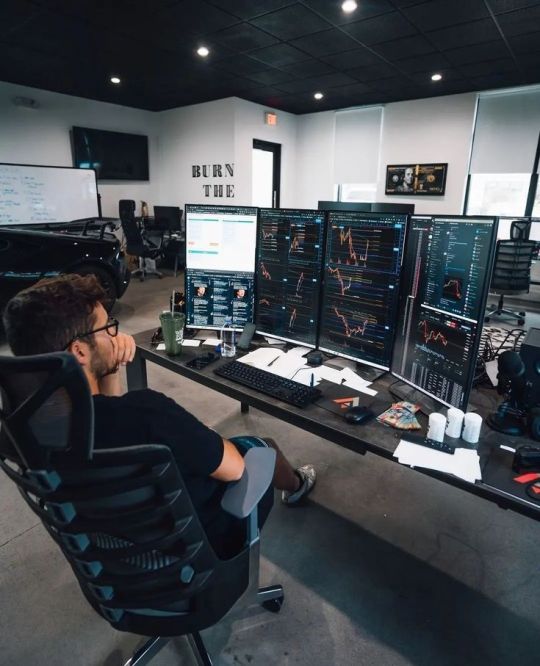
The idea that trading necessitates a large initial investment is out of date. Anyone can start small in the modern world.
Micro Trading Apps: Robinhood and other platforms enable trades with as little as a few dollars.
Learning with Low Risks: By starting small, you may gain an understanding of the market without worrying about suffering significant losses.
Leverage Wisely: If done well, even modest investments can increase in value.
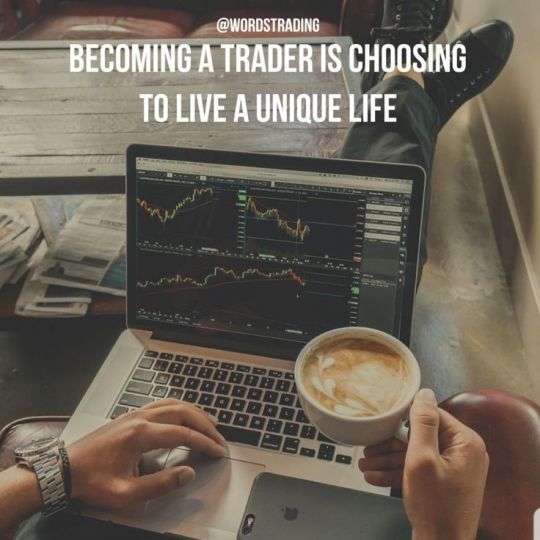
A Genuine Truth About Trading:
Anyone who promises you that trading is a quick way to make a lot of money isn't telling the truth. It all comes down to developing a skill set that becomes better with time. The possibilities are unlimited if you're prepared to study, practice, and maintain your discipline.

What is stopping you, then?
Kindly send your ideas or questions in comments so that we may have an open discussion.
"We're Building This Together"
Success is more meaningful when we achieve it together, with each shared story and learned lesson. This is more than just trading knowledge it’s about building a supportive community where we can openly share advice, experiences, and encouragement.
Your story could truly encourage someone else who is struggling on their journey!
Remember, each of you brings unique value and respect to this community, and I’m really grateful to have you here. Let's keep learning, growing, and achieving success together.
Your shared experiences, with all their ups and downs, encourage us all.
Together We're not just a community; we're a family, always standing by each other, no matter what comes our way.
Good Lucks 😊
#stock market#trading tips#cryptocurrency#tradingmindset#forextrading#learntotrade#trading success#financialfreedom#tradingskills#entreprenuership#passive income#personal finance
2 notes
·
View notes
Photo



Women have always ruled over commodities, produce, trade, the marketplace, business, agriculture, gold, precious metals, coins, investments, land, wealth!
50 notes
·
View notes
Text

Largest Roman Griffin Weight Unearthed in Turkey
A 2,300-year-old lead weight was discovered during excavations conducted at the 2,200-year-old Roman fountain located in northwestern Türkiye, at the ancient site of Assos.
According to the initial determinations, the object is the largest weight ever discovered. The weight bears intricate depictions of a mythological creature known as the griffin, which held significant cultural significance and was even featured on the city's coinage. Intriguingly, some representations showcase the city's name abbreviated as "ASS."
The excavations continue under the guidance of Professor Nurettin Arslan from the Faculty of Science and Letters at Çanakkale Onsekiz Mart University's Archaeology Department.
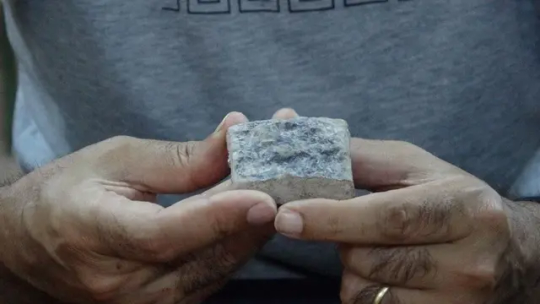
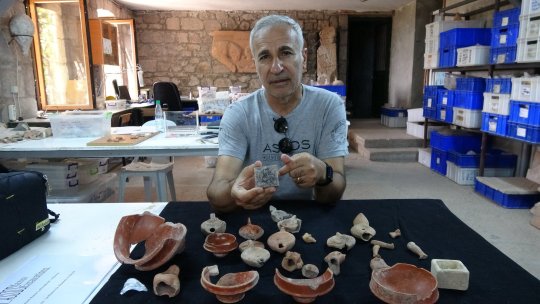
Following the short-term excavations in 1881-1883 conducted by the U.S., the Turkish team initiated excavations in 1981, and Arslan stated this year marks the 42nd year of ongoing excavations. Beginning in 2022, the ongoing excavations in this region have a central focus on uncovering the historical remnants of various structures from distinct epochs. Among the prominent features being explored are the hostelry buildings, called "ksenedochion" from Byzantine, assembly chambers called "nymphaeum" from Romans, and "gymnasium" from Hellenistic periods.
Arslan, the lead archaeologist, has outlined a comprehensive vision for the future, indicating a transition into the implementation phase for approved restoration projects. Foremost among these projects is the revival of the ancient theater, which, once restored, is anticipated to evolve into a vibrant hub for festivals and concerts, thereby transforming Assos into a captivating cultural destination.
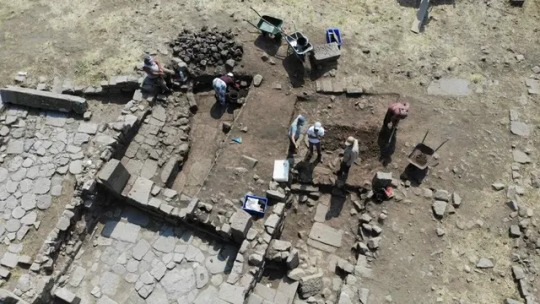


Our excavation work here is not yet complete. The space between this fountain and the bedrock, though not yet fully explored, has emerged as a compelling source of archaeological riches. Functioning as a repository during the 3rd and 4th centuries A.D., this area has bestowed upon us a wealth of data. The previous year saw us unveiling a selection of remarkable discoveries from this locale. Building upon that momentum, our efforts this year have yielded a diverse array of artifacts. Notable among these are utilitarian items such as pottery and vessels, shedding light on the daily life of late Roman Assos."
"Further enriching the narrative are small terracotta figurines, which are believed to have played a role in religious ceremonies. Also unearthed are remnants of tableware, alongside an abundance of animal bones, predominantly those of sizeable cattle. Our analysis has discerned evidence of the consumption of animals like pigs, goats, and sheep. While pigs appear to have been a staple, the presence of other species is also noteworthy. For a more comprehensive understanding, we eagerly await the detailed assessments of specialized researchers on this zoological assemblage," he said.
"The artifact that stands before us holds a distinct place in Assos's historical tapestry—a lead weighing unit. A tangible relic from the bygone era, these weights held city-specific significance, employed primarily for trade and the precise measurement of commodities. Comparable instances have been recovered from Hellenistic tombs, although those variants were characterized by lighter weights. This specific lead weight, however, surpasses its predecessors in heft, tipping the scales at approximately 320 grams. Originating from the late Roman Assos, its origins trace back to the 2nd century B.C., offering a link to the city's past. Hailing from a time when the Agora played a pivotal role, this artifact serves as a testament to the meticulous practices of trade and measurement that once thrived within Assos's bustling marketplace," elucidated the archaeologist.

#Largest Roman Griffin Weight Unearthed in Turkey#ancient site of Assos#ancient artifacts#archeology#archeolgst#history#history news#ancient history#ancient culture#ancient civilizations#roman history#roman empire#roman art
19 notes
·
View notes
Text
In its uncertainty, feminism at this moment hedges with a philosophy of individual choice: let there be rights; let there be choices; let there be no right or wrong way for all women. Neo-rationalism is thus condoned (after all it champions the right to individual choices). And neo-romanticism is condemned only for its absolutism, for its hostility to free choice. As neo-romanticist ideology gains ground, fueled by the subjective crisis in women's lives, feminism seems to be come ever more nervously defensive of "choice" for its own sake, less and less prone to pass judgment on the alternatives, or to ask how these came to be the choices in the first place.
The reason we hang back is because there are no answers left but the most radical ones. We cannot assimilate into a masculinist society without doing violence to our own nature, which is, of course, human nature. But neither can we retreat into domestic isolation, clinging to an archaic feminine ideal. Nor can we deny that the dilemma is a social issue, and abandon each other to our own "free choices" when the choices are not of our making and we are not "free."
The Woman Question in the end is not the question of women. It is not we who are the problem and it is not our needs which are the mystery. From our subjective perspective (denied by centuries of masculinist "science" and analysis), the Woman Question becomes the question of how shall we all—women and children and men—organize our lives together. This is a question which has no answer in the marketplace or among the throng of experts who sell their wisdom there. And this is the only question.
There are clues to the answer in the distant past, in a gynocentric era that linked woman's nurturance to a tradition of skill, caring to craft. There are the outlines of a solution in the contours of the industrial era, with its promise of a collective strength and knowledge surpassing all past human efforts to provide for human needs. And there are impulses toward the truth in each one of us. In our very confusion, in our legacy of repressed energy and half-forgotten wisdom, lies the understanding that it is not we who must change but the social order which marginalized women in the first place and with us all "human values."
The romantic/rationalist alternative is no longer acceptable: we refuse to remain on the margins of society, and we refuse to enter that society on its terms. If we reject these alternatives, then the challenge is to frame a moral outlook which proceeds from women's needs and experiences but which cannot be trivialized, sentimentalized, or domesticated. A synthesis which transcends both the rationalist and romanticist poles must necessarily challenge the masculinist social order itself. It must insist that the human values that women were assigned to preserve expand out of the confines of private life and become the organizing principles of society. This is the vision that is implicit in feminism—a society that is organized around human needs: a society in which child raising is not dismissed as each woman's individual problem, but in which the nurturance and well-being of all children is a transcendent public priority . . . a society in which healing is not a commodity distributed according to the dictates of profit but is integral to the network of community life . . . in which wisdom about daily life is not hoarded by "experts" or doled out as a commodity but is drawn from the experience of all people and freely shared among them.
This is the most radical vision but there are no human alternatives. The Market, with its financial abstractions, deformed science, and obsession with dead things—must be pushed back to the margins. And the "womanly" values of community and caring must rise to the center as the only human principles.
-Barbara Ehrenreich and Deirdre English, For Her Own Good: 150 Years of the Experts’ Advice to Women
#barbara ehrenreich#Deirdre English#the future of feminism#masculinist culture#neo rationalism#neo-romanticism
21 notes
·
View notes
Note
Name one thing bad about viewing designs as trading cards besides someone spending too much on them like anything else
easy
viewing designs as trading cards means you boil people's artwork down to its subjective value im sure you'd love for your work to be treated like a baseball card
people who view designs like that view other people's designs the same way and don't respect them or their stuff at all i.e. always asking to be on ping lists or asking if a forever homed character will be sold
being in a community meant to be about interacting with characters aka a species means you ultimately aren't even there for it you're simply there to use them as a commodity
what's the ultimate goal of this even? to have what everyone else wants? to spend the most money? if there is none then it means you will never be happy with what you have which is pretty sad ngl and you have a spending addiction
will you draw or write or characterize any of these adopts either? or will you spend all your time watching the marketplace channels like a hawk and trying to constantly trade up or make a new lorekeeper account for another species just to try and have trade fodder? do you want to wake up at 2am to try and slam AB in auctions with 10 other competitors? for what? because seel or chuchy or kitkaloid drew it? even if were just a drawing of a pile of shit? is that how you want to view things, based on how much someone else wants it? for traits that some shithead made up and said what was rare a what wasn't? to look at like a picture in a museum that you could've done then without spending hundreds of dollars?
cs loves trying to say it doesn't see designs as trading cards yet treats them as trading cards every single step of the way to the point you think asking that question is somehow a decent enough gotcha anyways merry christmas and fuck off
11 notes
·
View notes
Text
Mending Shadows // Chapter 17
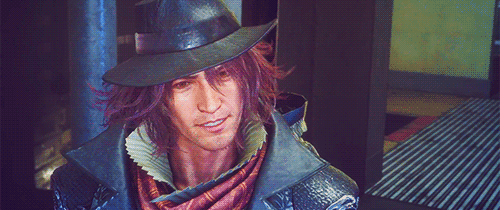
Summary:
Y/N was a simple Scavenger of Lucis, until meeting a deadly blow at the hands of an infected creature. At the crossroads of death, they are found by Niflheim’s cryptic Chancellor with his own agenda. Now bonded to Ardyn Izunia, and tossed into the world of Niflheim, Y/N struggles to cope with their new life as an Imperial Icon all the while battling their feelings toward their fate and that of Ardyn’s.
Click here to read on AO3
Y/N found themself in another world known as the Marquet. The atmosphere was vivid with folks scattered like colorful birds venturing from one nest to another to trade wares and gifts. The jovial nature of it all rivaled the wholesome notoriety that Lestallum had back home in Lucis. That town was well known for it's extravagant marketplace, where anyone could find anything. Y/N smiled while they thought back to their earlier days as a Scavenger. Lestallum was the cornerstone for people looking to get into the trade, and Y/N remembered their first assignment seeking trinkets from areas that Niflheim ransacked. The memories reminded them of how strange it was to now be on the other side of the coin.
As Ardyn and Y/N ventured further into this universe, there was no need to fit a name to a face. Everyone had somewhere to go, and couldn't be bothered with. That didn't mean there wasn't anyone who gawked when they saw the Chancellor roaming about the stalls, but no one took the chance to speak with either party. It was out of courtesy, or people were flat out afraid. As far as Y/N was concerned, it was probably both. Either case, Y/N felt much at ease being in the Marquet than at the restaurant.
While Ardyn was sampling wares from one of the stalls, Y/N observed a group of young men being boisterous. They were loud, much like their feminine companions that were practically joined at the hip. If Y/N had to guess, it was a large group date. The clan looked as if they were having the time of their life looking around at everything, and Y/N couldn’t help but notice all the men wore hats similar to Ardyn’s. They let out a laugh, shaking their head in disbelief while wondering if the citizens of Niflheim inspired his eccentric taste in attire, or if he himself created the trend. Their thoughts went elsewhere, when they heard Ardyn let out a loud thank you.
Y/N watched Ardyn return with a small purple pouch from one of the stalls. He was smiling from ear to ear, holding onto the possession like it contained all the world’s happiness within. Seeing him in such a light was a peculiar commodity. Y/N couldn’t recall a time in past happenings where Ardyn seemed to be genuinely delighted. Even during moments where he carried a smile while enacting cruelty, his eyes weren’t there in spirit. Almost as if he was going through the motions just for the sake of getting from point A to point B.
“Let’s carry on,” Ardyn encouraged. He used his free hand to gently coax Y/N into walking with him through the crowd. Every so often, his right arm would come around Y/N’s waist and pull them close to his body. Ensuring they wouldn’t crash into anyone that was traveling through the alley.
“There’s so many people,” Y/N remarked and glanced around. There were vendors as far as the eye could see, and most were illuminated by candlelight and neon signs. “I’m surprised you suggested coming down here, especially after the Gala.”
“I may be Chancellor, and I abhor most humans, but I do have vices that I simply can’t overlook.” Ardyn mused with a sigh. “Venturing into locations like this on my own accord is as close to normal as I'll get."
“And here I thought the modern world scared you.” Y/N couldn’t help but jest. They smirked seeing Ardyn glare at them, albeit playfully.
“On the contrary, there are some elements of your time I do enjoy. Though you can say I am quite picky.”
“Your time,” Y/N repeated with a smile, letting the words drip from their mouth. “You sound so old.”
“Well, I am ancient. All things considered, you should respect your elders.”
Both Ardyn and Y/N laughed. It was cliche’ but neither seemed to care. That was another thing Y/N picked up on. How Ardyn seemed so nonchalant compared to the grandiose persona he had put forth before the highest of Niflheim. It was as if someone else had taken over the wheel, but the mischief remained. This man who was beside them, didn’t feel like the same one that dragged them through the trenches back in Lucis; who took delight in prolonging ones suffering for his own gains.
Y/N wasn’t sure if this was yet another trick, but there was something endearing about the Ardyn that was present. Something that made them feel comfortable for the first time in a long while. The fact he was venturing into common ground--in one of the lowest points of Gralea--just to make them comfortable after dealing with culture shock from the rich and powerful, told Y/N a great deal: he did care in his own way, about how they were feeling. Even if he’d never admit it out loud.
“So,” Y/N cleared their throat, gesturing at the pouch to distract themself. “What did you buy at that stall back there?”
Ardyn did a quick double take and smirked. He stopped walking, observing Y/N halt as they curiously locked their eyes upon the bag. More people in the Marquet came and went as he removed a dark square piece. The roasted fruity smell hit Y/N’s nose, and they felt their mouth salivating instantly.
“Is that--”
“Dark chocolate with sea salt.” Ardyn spoke proudly, fiddling with the piece between his fingers. “I can never pass these up when I come to the Marquet.”
“I thought you didn’t care much for food? You said being immortal, it was a waste of time to indulge.”
“Ah, so I have!” Ardyn chuckled. He was grinning like a kid who had tricked another. “I may have been ever so slightly perfidious with you. I still regard my earlier words but...”
“But what?”
“I can’t resist indulging my sweet tooth.” Ardyn mused.
Y/N made a face and chortled. “I thought you would’ve been a more savory type of person.”
Ardyn shrugged. “I’ve always had a weakness for sweets. Such decadences were quite a rare commodity in my time. You modern day folk have everything within an arms reach, and haven’t the slightest how good you have it.”
“I feel I should be insulted,” Y/N began then sighed. “Though I suppose you’re not entirely wrong. Folks are quite greedy in Lucis when it comes to resources.”
“And to think,” Ardyn began as he stepped closer into Y/N’s space. His head leaned down toward them. He heard their breath hitch slightly in their throat and smirked. “I didn’t have to persuade you to agree with me this time on a trivial affair. It seems you’re assimilating quite well.”
Y/N’s mouth parted, but no words would come forth. The richness of his voice had them stunned as did the fact that he was right in a way. Y/N shot Ardyn a glare and averted their gaze, hearing him laugh and he began to walk again.
Y/N remained beside Ardyn, and side eyed occasionally while he began to eat some of the squares. He looked to be on cloud nine, humming in delight every so often in between chewing. As much as Y/N wanted one, they dare not ask; not feeling comfortable overstepping. It had been months since they had a simple treat, not having enough gil to splurge for themself back in Lucis. Money had to go to essentials.
It was almost as if Ardyn read their thoughts for he stopped yet again. His right hand dug through the pouch and procured a piece. He then presented it to Y/N, smiling sincerely before he murmured.
“Go ahead, take it.”
Y/N couldn’t help but grin, unable to suppress it. Whatever barriers they tried to keep up broke down, feeling that they’d be a fool to pass this over for the sake of being unassuming. They reached out to grab the chocolate piece, only for Ardyn to retreat the hand away. Y/N furrowed their brows as their stomach sank. It was only when Ardyn snickered and showed off the playful gleam in his eye did Y/N catch onto his coltish antics. They made a face at him, and tried to snatch it out from his grasp only to miss and falter.
“So close!” Ardyn teased.
“Now you’re just being an ass for the sake of it!”
“Oh, you wound me so!” Ardyn feigned innocently. He avoided more swipes from Y/N, then stopped his motions upon hearing Y/N become winded. A chortle left his body before he raised the piece up to his mouth, and stuck the edge between his teeth. In his mind, he knew Y/N would be too coy for this next bit and decided to play it out in full.
Ardyn leaned forward with the chocolate pressed to his bottom lip, presenting it to Y/N. Giving no other option but to nearly kiss him for the sweet treat. The look of confusion and shock in their eyes made him nearly lose his focus, taking delight in how uncomfortable Y/N appeared at first. He was about to break the moment, eat the chocolate, then offer another to Y/N as compensation for dealing with his antics. However, Ardyn didn’t anticipate their next move.
His eyes scanned over Y/N as their head tilted up, and quickly grabbed a hold of the chocolate with their mouth, trying to avoid touching his lips with their own. He felt a rush of excitement travel down his spine at their boldness toward his flirtatious jest. It happened so quickly, but Y/N’s eyes lingered on his for longer than intended. The micro-expression was enough to make Ardyn's pulse rise as he watched Y/N take away half of the chocolate square. The piece disappeared into their mouth, and red in the face, they slugged Ardyn’s chest and lowered their gaze while munching on their reward.
Ardyn’s mouth began to hurt as he smiled and finished off the leftover chocolate in his mouth. His amber eyes scanned their body and he chuckled--and once more--put his arm around Y/N’s waist. This time for the simple pleasure of it doing it versus protecting them from the oncoming crowd. He began to lead them further down the Marquet, and sensing their heartbeat through the scourge, Ardyn presented the other chocolates in the pouch to them with his free hand.
“Consider it a sign of peace.” Ardyn taunted. “Something of a rarity these days between an Imperial and Lucian, wouldn’t you say?”
Y/N raised a brow, glancing between the pouch and Ardyn as if something else was going to come slithering out of the bag besides sweet treats.
“What’s the catch?”
“None at all but for your company to remain with me.”
Y/N smiled, feeling the heat that had pooled in their cheeks reaching for their ears. They were thankful the lighting down the alley was already warm, for it hid their physical reactions rather well from him. Y/N’s right hand hesitated before grabbing a few. Awe overcame their eyes when nothing sinister transpired and they started to nibble on a piece. Their brows furrowed, coming to an epiphany after Ardyn motioned for them to take more.
“Something the matter?” Ardyn tilted his head.
“I don’t want to take all of them,” Y/N began. “They’re yours.”
“Oh I don’t mind,” Ardyn smiled then gestured up ahead with the tilt of his chin. “There’s another shop over yonder. I was thinking you and I could splurge a bit on some other sweets. We could get a whole box to sample.”
“On your gil?”
“I insist,” Ardyn murmured sincerely. His smile was genuine, though in his eyes he seemed conflicted. Hesitance took hold of his tongue before he broke the barrier. “I rather like seeing you content.”
Y/N smiled and a calm silence fell between themself and Ardyn while they continued to transverse through the Marquet and all it’s treasures.
After enjoying the splendors, and a simple meal at one of the food vending stalls, Ardyn led Y/N to a small park outside of the city limits. Sitting on top of the Vixen’s hood, both he and Y/N munched on some of their sweet spoils from the trip. Every so often the cackling thunder of fireworks could be heard in the distance, and their soft glow could be seen casting a bright silhouette against the palace. The Gala had entered it's closing ceremonies, and both Ardyn and Y/N felt relief that the night was more or less, officially over.
“I’ve been pondering,” Ardyn cleared his throat, swallowing another piece of chocolate. “How would you feel establishing your own residence within the Capitol?”
“Hmm?” Y/N wiped their mouth, smearing a little bit of cake on the edge of their lips. They were too shocked to notice how Ardyn was eyeing the spot with a playful smirk. “Why would you suggest that?”
“Tuti reported you’ve been feeling homesick for your apartment in Galdin Quay. While the danger we face remains high, I could invest gil into providing you a comfortable dwelling near the Imperial Palace. You wouldn’t be confined to my residency.”
Y/N sighed. “You weren’t kidding about Imperial Help mouthing off.”
“I hate to say I told you so, but I told you so.” Ardyn teased with a snicker. He smiled hearing Y/N’s own giggles intermingle with his own bout.
“On a serious note,” Y/N let their laughter die down while contemplating Ardyn’s offer. “While that’s generous, I...”
“Yes?”
“I don’t want to leave,” Y/N admitted with honesty. They shook their head to emphasize their feelings, eyes scanning Ardyn’s sifting gaze. “Its been a good while, but I don’t feel comfortable being on my own in Gralea. I know I’m a hypocrite considering the many fights we’ve had about me being cooped up, but...I like knowing you’re nearby. It makes me feel safe.”
Ardyn’s features softened so quickly it took Y/N by surprise.
“I mean, when you’re not berating or mocking me, I like knowing you’re near.” Y/N laughed nervously.
“That was a poor save, but I’ll allow it.”
In the grand scheme of things, it wasn’t the funniest joke either had heard but the pair laughed for a good while. As antics died down, the Vixen’s radio moved on to a new song. Ardyn could feel the melody travel out the windows and to his ears. He allowed the tune to settle within his body, letting out a content sigh. He cast his gaze over Gralea’s skyscrapers in the distance, feeling his stomach pull in knots.
These past weeks had been challenging. From dealing with catching up on Niflheim’s politics to ensure his ends were sustained, to learning to live alongside another person, Ardyn had to admit he had his hands full. He couldn’t recall a time where things had been this complicated, save for his first year living within Gralea and experiencing culture shock on a level unknown to man.
He briefly glanced at Y/N, watching while they observed the sky with a fondness he hadn’t seen before. The familiar twist in his gut returned as he bit the inside of his cheek.
For a long time now, Ardyn had kept to himself. He couldn’t afford to reveal much of anything lest he undo his path to victory. There was no room for interpersonal relationships, save for shallow ones that brought him closer to his goals. He recalled the car ride with Y/N to and from the Marquet, conversations that gauged his intrigue during the month, and how it felt good talking to them. Not as Chancellor, not as Adagium, but as a man. As himself.
If only for a short while, Ardyn decided to indulge this further.
“Y/N,”
“Yeah?” They quietly replied, noticing how tense Ardyn appeared to be. “You good?”
Ardyn nervously scratched the side of his neck. “I wish to confide in you. About some serious matters I’ve neglected to regale. It’s imperative you know. This is however, your debut night and I know for the most part it was less than savory. I’ll leave this in your hands if you wish to hear it.”
“Whatever it is you have to tell me, it can’t be any worse than the crap I heard tonight.” Y/N quietly laughed, trying to quell the tension.
Ardyn gave a half smile. He was quite proud of their tenacity in the face of adversity.
“Very well. Given that Commander Pierce disclosed the sheep piece with you, I suppose I should start there.” There was brief hesitation on his part, then Ardyn's mouth began to move. “Since you and I set foot upon Niflheim, I’ve had teams of Imperial soldiers scouting for MedZin operatives. None were found until recently. Commander Pierce informed me they had been executed. You and I have nothing to worry about there."
“That's a relief, but what does this have to do with the sheep comment?” Y/N asked with a swallow. The tension of Ardyn’s voice was strong, like a dull knife yearning to cut into rock to sharpen itself. As if sensing their discomfort, Ardyn reached a hand out and placed it upon Y/N’s shoulder, giving a small squeeze before letting go.
“It was a code,” Ardyn began. “To forewarn that an enemy of high rank is disguising themself as someone less than to infiltrate Niflheim. A Glaive could be among the flock, and if our sheep is a Glaive, they have their underlings stationed accordingly in strategic positions.”
“What does this mean for us?”
“It means you and I need to do a better job at having one another’s back.” Ardyn candidly stated.
“Is that why you’ve been nicer than usual?” Y/N remarked with a huff.
“Perhaps,” Ardyn chuckled. He allowed sentiment to briefly flow through him before sighing. “You and I are in a much vulnerable position than ever before.”
“I can guess that if the sheep you were referring too finds out about us, how bonded we truly are, they could take advantage of it?”
“Essentially...”
With how soft he spoke, Y/N thought they might as well had been talking to a ghost. They canted their head, surveying Ardyn with concern.
“Let me ask you this,” He finally turned his head to Y/N, meeting their eyes. “Have you felt anything off when in the presence of my company?”
Y/N debated with themself about being honest with him, out of fear the truth would do a few things: one, make Ardyn hostile toward them once again and secondly, delay their death for the umpteenth time. With how his eyes bored into them, and how gentle those sparks of ember were, Y/N decided it was well worth the risk of getting burnt.
“I have…” They admitted.
“Details?”
Y/N gulped. “It’s hard to explain, but there were times when you became emotional around me, or something bothered you, and it felt like I was getting a taste of what it was like being you. All I could feel, was what you were going through. It's happened a lot, but in small spurts."
“Bleeds,” Ardyn murmured, furrowing his brows. He ignored the fact that Y/N had been keeping it to themself all this time, more concerned about the latter part of their conversation.
“What’s that?”
“It’s complicated. Nevertheless, I’ll attempt to put it into context you can understand,” Ardyn reassuringly proclaimed. He further gesticulated. “In my half of our bond, since I house the collective of the scourge, I feel the pain of every lesser daemon within the hive. You are not supposed to feel such burdens, but given that your sickness was overwritten by mine, you are beginning to feel as I do, hence what Verstael and I call a bleed. A bleedthrough, however, is more serious. It’s when our bodies are synched through the scourge to the point where memories and sensations blend into one. Neither can tell who is who. It’s not like when we first bonded, it’s more grotesque and violating.”
“That's...” Y/N pondered on the implications, feeling a strange conflict run through their mind. It wasn’t exactly anxiousness, but somewhere in the realm of unease.
“I experienced this with my previous bonded,” Ardyn explained, deciding to take hold of the reigns of the conversation while Y/N wrestled with their thoughts. “Initially, it wasn’t of consequence until much later.”
Y/N murmured quietly. “You told me they died. How did they perish in the end?”
Ardyn rubbed the back of his scalp. He knew this conversation was bound to come up, yet he hadn’t anticipated it so soon. Nevertheless, he decided to power through.
“I went insane,” Ardyn professed. “As did the plagued man who I shared my scourge with. I have voices inside of my head of entities whom I have consumed for knowledge and power. It’s aggravating, yet I can push it aside. The bleedthrough pushed me to an edge that frightened me. For him I imagine it was just as insufferable. He killed himself, and I felt it all. I even felt my own guts spill from my body. I've been bested many a time as an immortal, but never have I been brought to my knees as such.”
It was almost too easy for Y/N to put themself in both the man and Ardyn’s shoes. Whether it was from their own fear or the cold chill that decided to pass through the park, Y/N felt goosebumps rise against their flesh.
“It’s why I neglected to feed off of you as of late. The more I do it, the higher the risk we bleed into one another. After discussing it with Verstael, it’s not something we should gamble.”
“What about your powers being capped by the serum?”
“It’s a risk I’m willing to take,” Ardyn admitted. He avoided Y/N’s gaze, finding it difficult to look upon them. “I know there’s no stopping you from what you want in the end, but…I’m too involved now, if you catch my drift. Ensuring your death is a peaceful one, will ensure I too won’t suffer.”
Ardyn's words repeated in Y/N’s head several times. Memories of the second week living in Niflheim ran amok. How the pain of the darkness had driven Y/N to the point where out of desperation, they closed themself off in the bathroom and attempted to drown in the tub. Ardyn was on the other side of the capitol, meaning he couldn’t waltz in and save the day. Had it not been for Tuti making her rounds, Y/N knew in their heart of hearts they would’ve succeeded. Their lungs could still recall the weight of being crushed by liquid, and how the body wanted to breathe yet the brain couldn't fathom such a feat. When Ardyn arrived home that day, he never said anything about it, and carried on like usual.
Y/N felt guilt beginning to drift in and out of their heart while they reminisced. They were so caught up in their own misery that day, that they didn’t notice through Ardyn’s facade that he was hurt. His eyes always gave away his true feelings, no matter how subtle the attempt. That day his golden eyes looked exhausted, as if he had been drowning in a sea of morose. Drowning like Y/N had been until Tuti yanked them to the surface.
Ardyn was a bastard, but not even he deserved to feel that.
“I wasn’t thinking right. I just wanted it to be over,” Y/N blurted out. They couldn’t get the image of his eyes out of their head. It was so obvious now what was going on, that Y/N felt angry at themself. “I promise I won’t put you through that again.”
Ardyn remained quiet. At first, he was confused as to where the proclamation had come from. It dawned on him slowly, and he too felt an anger of sorts. He didn’t like that Y/N saw through his vulnerability, but he knew he couldn’t fault them for it. Not when he wasn’t honest with them in the first place.
“You have my thanks.” Ardyn forced himself to say. He grunted while he adjusted against the hood of the Vixen, facing his body toward Y/N’s.
“Ardyn,”
“Hmm?”
“Can’t you just sever the bond?” Y/N asked. “I know you said it was essential for it to remain, so if you needed to feed off me for power, you could. But now that you can’t even do that, I don’t see the point. Not when it’s hurting you.”
Not when I’m hurting you… Y/N corrected. They wished they had the courage to say it aloud, but nothing passed.
“I have contemplated that many times over, but...”
“But?”
Ardyn's eyes combed over Y/N before he glared, and faced the front window of the Vixen.
“We just need to remain patient. Both of us will have absolution by the end of this mess." He could tell that wasn’t what Y/N wanted to hear, but he knew they understood.
“Ardyn,”
“Yes?”
“Thank you for telling me what’s been going on, and for…all of this.”
“My pleasure.” He smiled.
Y/N drifted their gaze off of Ardyn and looked toward the fireworks. The display was dying down, signifying that the show was almost over. Letting out a breath, they glanced at the box of leftovers they had, no longer having the appetite to finish the meal off. Before Y/N could close it, they felt Ardyn’s hand reach out for theirs across the hood of the Vixen. His touch was delicate, as if he was handling paper and didn’t want to damage the integrity of the material. Y/N suddenly realized how close he was. His breath nearly fanned over their face while he spoke.
“I haven’t been entirely pleasant nor courteous, but…I am trying.”
“I see your effort.” Y/N murmured with a smile.
The tiny hairs on Y/N’s face rose at attention, feeling another wave of Ardyn’s breath drift along their skin. His eyes traveled back and forth between their lips and neck. At first, Y/N thought it to be a trick of the moonlight given how dark it was outside, but when he did it again, Y/N froze. They slowly tilted their head, as if trying to read him better and their nose accidentally brushed against Ardyn’s. Everything went quiet; the wind, and the soft clicks of cricket feet drowned in a silence that was as heavy as it was enthralling.
The amber of Ardyn’s eyes became inflamed like a scorching fire, and the scourge blacked out the whites of his orbs. Y/N felt their world implode as they were suddenly pinned to the Vixen’s hood, and Ardyn’s mouth had consumed their lips like he had been starved for centuries. Pleasure and pain danced in Y/N’s body as they attempted to gasp for air, but Ardyn's mouth was always right behind to take back what belonged to him. They felt his right knee shift in between their legs, forcing their body to spread before he started kissing aggressively down their chin and neck. His teeth raked against their skin. He groaned monstrously before biting with all the force he had pent up. He greedily kissed and licked up scourge and blood. Y/N's lungs began to run dry from screaming and moaning, unable to differentiate between ecstasy and hurt.
Lust numbed Y/N’s mind from wanting to escape. They clung their fingers into Ardyn’s hair, and hung on for the ride. He bit down harder, and they arched their back, feeling the force of his body grinding against theirs while he rummaged a hand through their hair, and yanked to further expose their neck. All of Y/N’s senses began to fade, save for hearing the soft smacks of Ardyn’s lips and the powerful thrum of a daemonic moan that left his body. He was bringing them to the edge of two deaths: one of mortality, and one of climax.
Y/N’s eyes widened in shock as they woke up. On instinct, they reached for their neck, and didn’t feel blood nor scourge oozing from a pocket of broken flesh. Blinking, their mind began to recall what truly happened.
“I haven’t been entirely pleasant nor courteous, but…I am trying.” “I see your effort.” Y/N murmured with a smile. The tiny hairs on Y/N’s face rose at attention, feeling another wave of Ardyn’s breath drift along their skin. His eyes traveled back and forth between their lips and neck. Y/N felt their face flush with warmth, and then they began to cough. What started as gentle heaves became heavier as the seconds ticked by. Ardyn backed off, snapping out of his trance. “Are you alright?” “I don’t know,” Y/N admitted, gasping when they felt a pressure travel beneath their chest. “I think a flare is coming. I didn’t bring any meds with me.” “Let’s get you home then.” Ardyn sprung into action. He carefully guided Y/N off the hood of the Vixen and into the car, making sure they were comfortable. He even went so far as to lean the passenger seat back for Y/N so they could lay on their side when the pressure on their body became unbearable. The car ride back to the palace was swift. By then, Y/N was so exhausted from the scourge that they nearly passed out. They remembered Ardyn carrying them in his arms. How he felt both warm and cold. The duality numbed much of the pain, and Y/N couldn't help but lean further into his chest. Once Ardyn made it through the halls and to his dwelling, Y/N remembered him propping their body onto the bathroom counter while he prepared something to drink. Had he not done that, Y/N knew they surely would've slept in his embrace with not a care in the world. The rest of the night was filled with Ardyn offering soothing hushes. Y/N remembered attempting to apologize for the inconvenience, but he'd always interrupt and encourage them to take the suppressants and drink despite the struggle. The last thing Y/N recalled was Ardyn lying them down against the mattress, bringing a blanket over them. His features were neutral while he combed a hand through their hair, and then he departed to his own room.
The dream had been a dangerous farce, and Y/N shuddered at how they felt disgusted with themself. Glancing toward their left, Y/N saw the clock overhead. It was almost 8am, and they had been sleeping for a few hours. They could feel the exhaustion from the night all throughout their muscles, making them wish perhaps they didn’t take Ardyn up on traveling to the Marquet given how lengthy the walk had been. They rolled onto their side, and tried to coax themself back to sleep; wanting to savor what they had been lacking.
When Y/N closed their eyes, the image of Ardyn biting down on their neck invaded along with the sound of his moans. They made a fist while clutching the sheets. Y/N could feel the familiar hum of the scourge as it rocked softly along their nerves. Anticipation and a breathless longing sunk into their stomach, twisting in knots that could only be untangled by the object of affection.
Y/N couldn’t believe themself. That their mind would fool around with such feelings toward Ardyn simply because he had been kind to them. The conversation about bleedthroughs suddenly traveled over Y/N’s mind. Shame and arousal tugged at them at the thought that Ardyn might’ve felt the experience through the scourge. No, no there was no way… Y/N said to themself, trying to self soothe to save face.
“Oh screw this,” Y/N let out a deep breath, and forced themself to wake up. They needed a distraction, anything but lying in bed and dwelling in whatever tension this was.
Y/N glanced out the window nearby while walking down the main hall. Gralea was still asleep, much like Ardyn’s residency. There was not a peep from Imperial Help nor the man of the hour. They could see the sun barely coming up over the mountains.
Y/N wondered what the sunrise looked like today in Galdin Quay, missing the sound of the ocean waves draw in and out along the surf during the morning hours. The nostalgia drowned out the embarrassment Y/N had started the day with, and they ventured off to the kitchen to make something for themself and Ardyn.
#mending shadows#ardyn lucis caelum#ardyn izunia#ffxv ardyn#ffxv fanfic#fanfiction#ao3#ffxv#final fantasy xv#gender neutral reader#ardyn x reader#nonbinary reader#ardyn x you#ao3 fanfic
10 notes
·
View notes